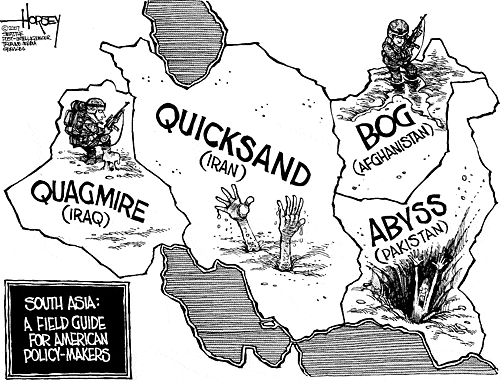Wednesday, November 14, 2007
NYT: Decks Are Stacked in War Crimes Cases, Lawyers Say


A detention area at Guantánamo Bay, Cuba, where a military commission began hearing new claims on Thursday.
Decks Are Stacked in War Crimes Cases, Lawyers Say
GUANTÁNAMO BAY, Cuba, Nov. 8 — The administration's problem-plagued military commission system started up here again Thursday, but it began with contentious new claims that the war crimes cases are unfairly stacked against detainees.
Military defense lawyers said that on the eve of the hearing, military prosecutors told them for the first time of a government witness who might be able to help a detainee, Omar Ahmed Khadr, counter the war crimes charges on which he was arraigned Thursday.
Mr. Khadr, the only Canadian detainee at Guantánamo, has been held here since he was 16. He is now 21.
"It is an eyewitness the government has always known about," said Lt. Cmdr. William C. Kuebler of the Navy, Mr. Khadr's chief military lawyer, who questioned why the military was only now informing the defense. Mr. Khadr is charged with the murder of an American soldier, spying, material support for terrorism and other charges.
In court, military prosecutors accomplished one of their goals after a long delay in the commission cases by completing the new arraignment for Mr. Khadr. It was the first arraignment since all Guantánamo war crimes cases were stalled by legal rulings against the prosecutors in June that were later overturned.
Thursday's proceedings were important for Bush administration officials, who are frustrated at the pace of the Guantánamo war crimes cases, which have repeatedly been halted by practical difficulties and court rulings.
Mr. Khadr appeared in court wearing a white prison uniform — the color indicated he was a compliant detainee — and was relaxed throughout the two-hour hearing.
Mr. Khadr's case has drawn wide attention, both because of his age and because his Toronto family has deep ties to Al Qaeda. His lawyers argue that he should be treated with the leniency often accorded child soldiers under international law, since he was a teenager at the time of the alleged crimes. Mr. Khadr did not enter a plea, and no trial date was set.
The controversy over the witness emerged after the hearing was completed. Defense lawyers said the new disclosures by prosecutors in closed-door meetings showed that the system was not intended to be fair.
Michael J. Berrigan, the deputy chief military defense lawyer for the Guantánamo cases, told reporters that defense lawyers had been told Tuesday night of the existence of a witness who could provide information that could help Mr. Khadr.
"How we can have newly discovered evidence is beyond me," since prosecutors have been pursuing charges against Mr. Khadr for years, Mr. Berrigan said. The lawyers said they could not describe the witness because prosecutors told them the information was classified.
"Every time you all come down here you see the problems in this process," Mr. Berrigan said. Spokesmen for the military said prosecutors turn over information that could help a defendant when they learn of it. The military prosecutors declined to answer questions from reporters.
In response to defense assertions that military commission participants are under pressure from superiors to get war crimes cases moving quickly, a spokeswoman for the Office of Military Commissions, Lt. Catheryne Pully, said, "Our interest is in making sure the process is done correctly, not quickly."
Commander Kuebler used the courtroom session to mount a strenuous challenge to the military judge hearing the case, Col. Peter E. Brownback III of the Army.
Commander Kuebler noted that the judge had barred the defense from raising challenges at this stage of the case to the constitutionality of the military commission system. He added that the judge had told him in a closed-door meeting that he had "taken a lot of heat" after issuing one of the rulings in June that stalled the commission cases. Pentagon officials and a White House spokesman said they disagreed with the June rulings.
Colonel Brownback, clearly irritated, said he had not intended Commander Kuebler to disclose that conversation but said, "I never said anyone who had any influence over me said anything."